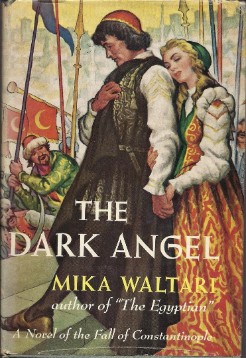Today I saw you and spoke to you for the first time.
It was like an earthquake; everything in me was overturned, the graves of my heart were opened and my own nature was strange to me.
I am forty, and I believed I had reached the autumn of life.
I had wandered far, known much and lived many lives. The Lord had spoken to me, manifesting Himself to me in many ways; to me angels had revealed themselves and I had not believed them. But when I saw you I was compelled to believe, because of the miracle that had happened to me.
I saw you in front of the Church of St. Sophia, by the bronze doors. It was when everyone was coming out, after Cardinal Isidor amid icy silence had proclaimed in Latin and Greek the Union of the Churches. In celebrating the splendid Mass that followed he recited the creed, and when he reached the interpolation “and from the Son” many covered their faces, while from the women in the galleries could be heard bitter sobbing. I was standing in the press of people in a side aisle beside a grey column; when I touched this I felt that it was moist, as if even the chill stones of the temple were sweating out their anguish.
Then they all left the church, in the order prescribed many centuries ago, and in the midst of them walked the Basileus, our Emperor Constantine, erect and solemn, his head already grey beneath the golden hoops of the crown. Each one walked in the appropriate clothes and colours: the officials from the Palace of Blachernæ, ministers and logothetes, the senate in its entirety, and then the archons of Constantinople in order of lineage. No one had dared stay away and so let his views be known. On the Emperor’s right I recognised all too well Phrantzes, the Chancellor, as with cold blue eyes he surveyed the people round him. Among the Latins I noticed the Venetian bailo and many others whom I knew by sight.
But Megadux Lukas Notaras, Grand Duke and Commander of the Imperial Fleet, I had never seen before. He was a head taller than the rest, and a swarthy, haughty man. His glance was keen and scornful, but in his features I read the melancholy common to all members of the ancient Greek families. When he came out he was agitated and wrathful, as if unable to endure the deadly shame that had fallen upon his Church and his people.
When the chargers were led forward there was some disturbance among the people, who began to cry out upon the Latins. There were shouts of “Down with unlawful interpolations!” “Down with Papal rule!” I would not listen, for I had heard more than enough of it in my youth. But the hatred and despair of the crowd broke out like the roaring of the tempest—like an earthquake—until the practised voices of the monks led them into a rhythmic chant of “Not the Son, not the Son!” It was the feast of the holy Spiridon.
By the time the procession of the noble ladies started, some of the Emperor’s suite had already mingled with the crowds that were surging and waving their arms in time to the howling chant. Only round the sacred person of the Emperor was there space, and as he sat on his charger his face darkened with sorrow. He was dressed in a purple, gold-embroidered mantle and purple boots adorned with the two-headed eagle.
